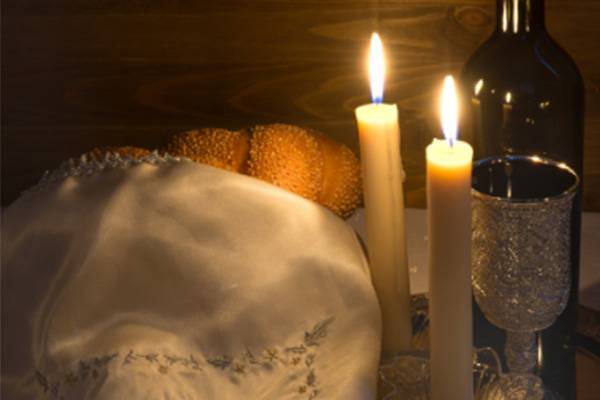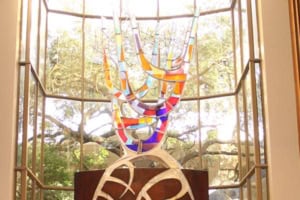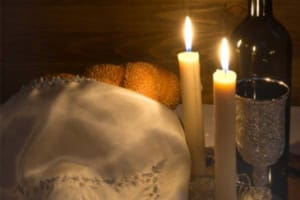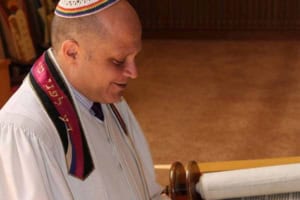Shabbat Parashat Naso – June 6, 2025 / 11 Sivan 5785
by rabbi Andrew Paley
But I guarantee you know what he’s famous for.
Dr. Boirac was the one who coined the term déjà vu—that strangely familiar feeling that you’ve been somewhere before, seen something before, lived this moment before, even though you haven’t. Or as the great Yogi Berra once allegedly quipped, “It’s like déjà vu all over again.”
This week’s Torah portion, Parashat Naso, offers us one of the most familiar and cherished blessings in all of Jewish tradition—the Birkat Kohanim, the Priestly Blessing. Just three verses.
Ancient words we whisper over our children on Friday nights. Words spoken under the chuppah, at the end of Yom Kippur, at moments of homecoming and farewell. Words that have traveled with our people across centuries of longing, resilience, and hope:
“May God bless you and protect you.
May God’s face shine upon you and be gracious to you.
May God lift up God’s face to you and grant you peace.”
They are beautiful. They are bold. And this week—they were heartbreakingly tested. It’s déjà vu all over again.
In Boulder, Colorado, Jews were attacked—for walking, praying, and hoping.
It was not a protest. It was not a confrontation. It was a peaceful solidarity walk, organized by Run for Their Lives, a group that gathers weekly to call for the release of hostages still held in Gaza. They walked through downtown Boulder. They shared prayers and reflections. They bore witness. They hoped. And for that—for that—they were attacked. A man approached them and threw Molotov cocktails. He sprayed a makeshift flamethrower. He shouted “Free Palestine” as he lit fire to Jewish lives. Twelve people were injured, including an 88-year-old Holocaust survivor. The Department of Justice is now investigating it as a federal hate crime.
And once again, we are reminded—painfully—that antisemitism doesn’t care what you believe, how you vote, or how peacefully you gather. Sometimes, it’s not about what we say. It’s simply about who we are.
So what do we do with a blessing like this in a week like this?
“May God bless you and protect you”?
We said those words last week. We say these words every week! The Jews in Boulder may have said them before their walk. And yet—here we are again. But the Torah doesn’t offer the Priestly Blessing as a poetic comfort. It gives it as a command.
“Thus shall you bless the people of Israel… place My name upon them, and I will bless them.”
(Numbers 6:27)
To bless is to resist despair. To bless is to speak dignity into a world that often strips it away. To bless is to insist that life is sacred—and that no act of violence can erase that truth. That’s what those Jews in Boulder were doing. And That’s what we must do now.
And this week, we also mark the beginning of Pride Month. Now, let’s be clear: the attack in Boulder had nothing to do with LGBTQ+ identity. But the themes of Pride—visibility, vulnerability, the refusal to be erased—are deeply Jewish themes.
And they echo the Birkat Kohanim.
“May God’s face shine upon you…”
In Judaism, that isn’t about light—it’s about recognition; to have God’s face shine on you is to be fully seen, fully valued, fully human. That is the moral claim of Pride. And it is the spiritual demand of Torah; to widen the circle of blessing until it includes everyone God has created.
And still—it’s hard. It’s exhausting.
A friend and colleague, Rabbi Mark Bloom, wrote something this week that struck me deeply. He was interviewed about what it’s like to be a rabbi right now, in the midst of rising antisemitism.
And afterward, he shared this:
“The hurt my community feels personally and the responsibility I feel as a rabbi of a Jewish community is a weight that is often too much to carry… But as tired as you may be of hearing about this from your Jewish friends, please remember that they—we—are even more tired of living it. We need your loving arms and powerful voices in our corner right now.”
Yes. That.
We are tired of having to explain that a Molotov cocktail is not “resistance.” We are tired of being told that fear for our safety is political. We are tired of watching the line between critique of Israel and hatred of Jews blur into flame. And yet—we are not done.
We are all priests now.
In ancient times, only the Kohanim could offer the Priestly Blessing. But in this fractured, flammable, uncertain world—we are all called to that sacred task.
To bless with courage.
To bless with clarity.
To bless when it would be easier to retreat.
When we show up across lines of difference—we are priests.
When we resist the temptation to dehumanize—we are priests.
When we see the image of God in those who suffer—even those far from us—we are priests.
Because to bless is not to approve. To bless is not to surrender. To bless is to say: You are not invisible. Your pain matters. Your life is sacred.
So tonight, we bless. Again. Still. Always.
We bless the wounded in Boulder.
We bless those still held hostage.
We bless those who live in fear, and those who live in truth.
We bless those who show up when it would be easier to walk away.
We bless our friends—Jewish and not—who stand in our corner.
We bless those in Gaza whose lives have been shattered by war—whose grief and humanity we dare not ignore.
We bless immigrants who live in the shadows of fear—those who wonder if safety will ever be theirs, who long for dignity and belonging.
We bless because blessing is not agreement. It is not endorsement. It is resistance to despair, and a refusal to let pain harden into hatred. It is a way of saying:
“You matter. Your suffering matters. Your life is sacred.”
And so, as we’ve done for thousands of years, in the face of uncertainty and fear:
We lift our hands.
We lift our eyes.
We lift our voices—and we bless:
“Y’varechecha Adonai v’yishmerecha…
May God bless you and protect you.
Ya’er Adonai panav eilecha vichuneka…
May God shine light on all who feel unseen, and grant you grace.
Yisa Adonai panav eilecha v’yasem l’cha shalom…
May God lift every face turned in fear—and grant us peace.”
A peace that shelters all who seek it.
A peace that refuses to give up.
A peace we will not stop blessing toward.
Amen.





